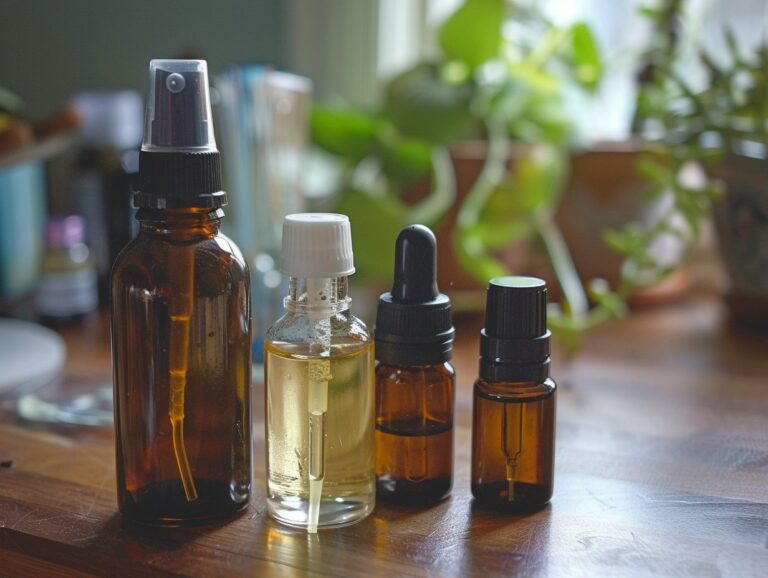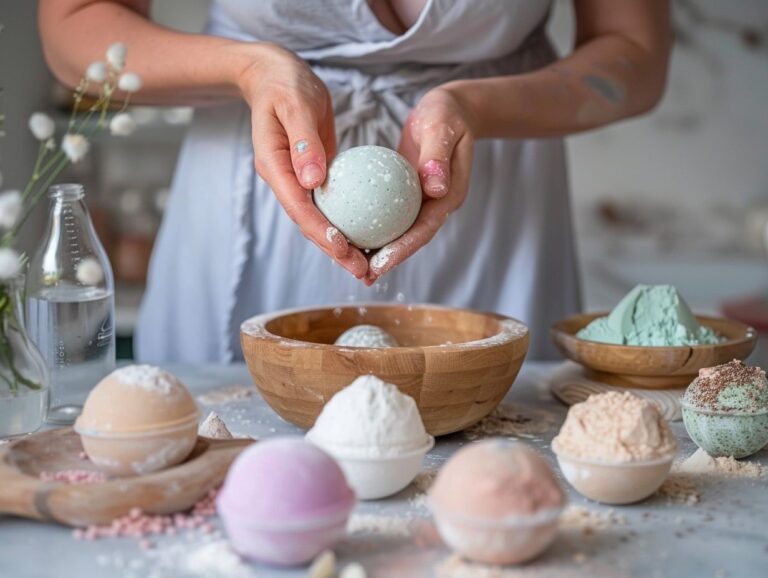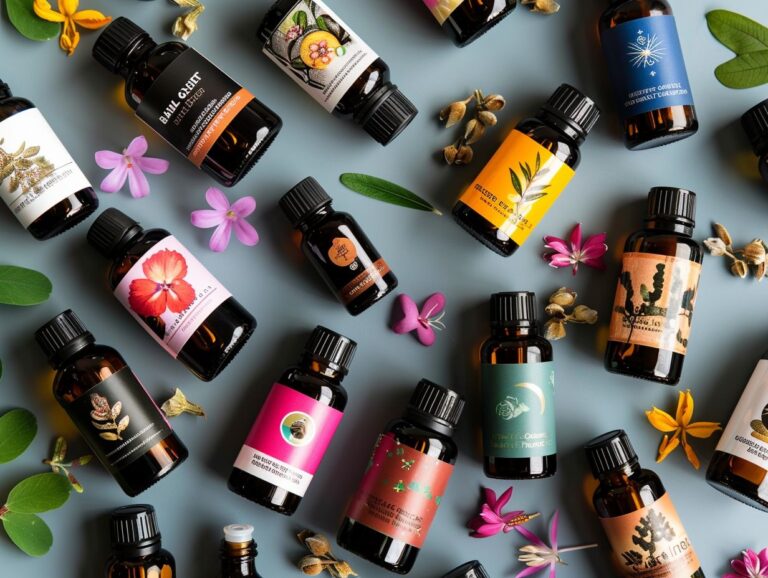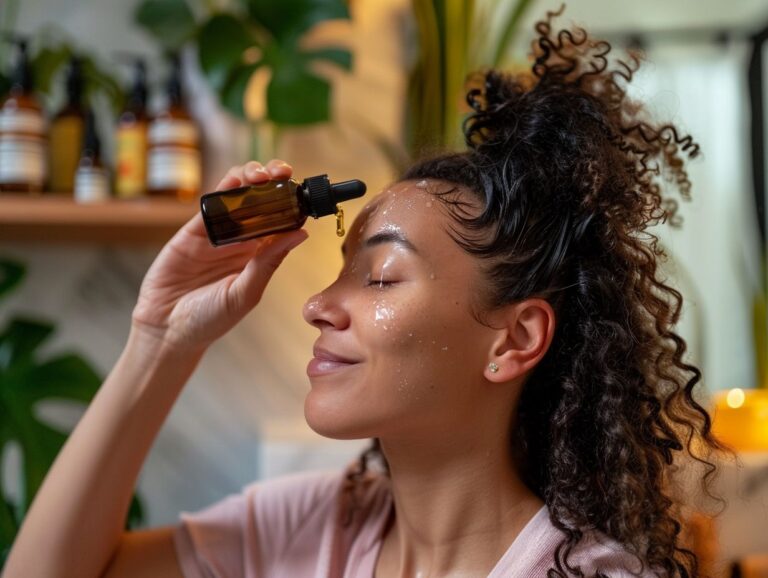Can Essential Oils Cause Blood Clots
Essential oils have gained popularity for their various health benefits, but can they actually pose a risk?
In this article, we will explore the potential link between essential oils and blood clots. We will discuss the symptoms and causes of blood clots, as well as the risk factors associated with their development.
Discover the treatment options available for blood clots and explore whether essential oils can increase the risk of blood clots. Learn more about this important topic and how to protect your health.
Key Takeaways:
What Are Essential Oils?
Essential oils are concentrated plant extracts that retain the natural smell and flavor, or essence, of their source. They are typically extracted through distillation or cold pressing and have been used for centuries in various cultures for their aromatic and therapeutic properties.
Lavender essential oil, for instance, is often derived from the flowering tops of the lavender plant through steam distillation. This versatile oil has a long history, dating back to ancient Egypt and Rome, where it was used for its calming and relaxing effects. On the other hand, eucalyptus oil is commonly extracted from the leaves of the eucalyptus tree and is renowned for its respiratory benefits, often used in cold remedies and inhalants. Similarly, peppermint oil, obtained from the peppermint plant, boasts cooling properties and is favored for alleviating headaches and digestive issues.
How Are Essential Oils Used?
Essential oils can be used in a variety of ways, including aromatherapy, topical application, and in household products. Aromatherapy involves inhaling the aroma of essential oils to promote relaxation or address specific concerns, while topical application involves diluting oils and applying them to the skin.
Another popular method of utilizing essential oils is through diffusion, where the oils are dispersed into the air using devices like diffusers or humidifiers. This method allows the aroma of oils like tea tree oil, thyme, or frankincense to fill the room, creating a calming or energizing atmosphere.
What Are the Potential Risks of Using Essential Oils?
While essential oils offer numerous benefits, there are potential risks associated with their use, particularly in certain individuals or when used improperly. These risks can include skin irritation, allergic reactions, and in some cases, interactions with medications or underlying health conditions.
It is crucial for individuals, especially those with sensitive skin or pre-existing medical conditions, to exercise caution when using essential oils.
Precautions
- Diluting the oils before topical application
- Performing patch tests on a small area of skin
- Consulting with a healthcare provider beforehand
Pregnant women, young children, and pets may have heightened sensitivity to certain essential oils, so extra care is needed when incorporating them into daily routines.
Can Essential Oils Cause Blood Clots?
There is ongoing research on the potential link between essential oils and blood clotting. While some essential oils like lavender, eucalyptus, and peppermint are known for their anti-inflammatory properties, there are concerns about their impact on clotting factors and platelet function.
Essential oils have been studied for their potential effects on various biological processes, including blood clotting mechanisms. Some studies suggest that certain oils, such as wintergreen and clary sage, may interact with clotting pathways in the body. It is essential to note that the research in this area is still evolving, and more studies are needed to fully understand how these oils influence clotting. Factors like dosage, individual differences, and potential interactions with medications need to be considered when exploring the effects of essential oils on blood clotting.
What Are the Symptoms of Blood Clots?

Symptoms like shortness of breath, chest pain, coughing up blood, or sudden numbness or weakness on one side of the body can signal the presence of a blood clot. It is crucial to pay attention to these signs as untreated blood clots can result in serious conditions like deep vein thrombosis, heart attack, or even organ damage.
What Are the Causes of Blood Clots?
Blood clots typically form in response to injury or to prevent excessive bleeding. The primary mechanisms involved in clot formation include the interaction of clotting factors, platelets, and the cascade of reactions that lead to fibrin formation and clot stabilization.
When a blood vessel is damaged, platelets are the first responders that rush to the site of injury to form a plug and reduce blood loss. This initial platelet adhesion triggers a complex series of biochemical events, where clotting factors, such as Factor VIII and Factor X, play crucial roles in the coagulation process. These factors interact with platelets and the blood vessel wall to promote the conversion of prothrombin to thrombin, a key enzyme that converts soluble fibrinogen into insoluble fibrin strands. These fibrin strands create a mesh-like network that traps blood cells, further reinforcing the clot structure.
What Are the Risk Factors for Developing Blood Clots?
Several risk factors can increase the likelihood of developing blood clots, including obesity, smoking, prolonged immobility, and certain medical conditions such as cancer or thrombophilia. Inflammatory conditions and disruptions in clotting factors can also contribute to clot formation.
Along with lifestyle factors and medical conditions, genetic predisposition can play a significant role in blood clot formation. For instance, individuals with a family history of clotting disorders, such as hemophilia or factor V Leiden mutation, are at higher risk. Deficiencies in vitamin K can disrupt the body’s ability to produce clotting factors, leading to an increased risk of clot formation. Excessive levels of arachidonic acid, a substance involved in the inflammatory process, can promote excessive clotting by triggering platelet aggregation.
Can Essential Oils Increase the Risk of Blood Clots?
While essential oils are generally considered safe when used appropriately, there is ongoing debate about their potential impact on blood clotting. Certain oils like lavender, eucalyptus, and peppermint are believed to possess anti-inflammatory properties that may affect clotting factors in some individuals.
These oils are thought to inhibit platelet aggregation, a crucial step in blood clot formation, which raises concerns among some healthcare professionals.
Contrasting views suggest that the effect of essential oils on blood clotting may vary depending on the individual’s health status and the specific oil used.
What Are the Treatment Options for Blood Clots?
The treatment of blood clots typically involves the use of anticoagulants or blood thinners to prevent clot propagation and reduce the risk of complications. In severe cases, procedures such as thrombolysis or surgery may be necessary to dissolve or remove the clot.
Anticoagulants work by targeting different factors in the clotting cascade to disrupt the formation of blood clots. They are crucial in preventing the clots from growing larger and from breaking off to travel to vital organs such as the lungs or brain. Individuals with conditions like von Willebrand disease, a genetic disorder affecting blood clotting, may require specialized treatments tailored to their specific needs. In such cases, healthcare providers carefully design treatment plans to address the underlying cause of clotting abnormalities and prevent potential complications.
How Are Blood Clots Diagnosed?

Platelet testing is an essential component of diagnosing blood clots, as it helps healthcare providers understand the role these blood cells play in clot formation.
Along with traditional tests, advancements in imaging technologies like magnetic resonance imaging (MRI) and angiography have provided innovative ways to visualize blood clot formation.
Recent research published in leading thrombosis journals has shed light on the use of biomarkers for early detection of clotting disorders, offering promising avenues for more targeted and effective treatments.
What Are the Medications Used to Treat Blood Clots?
The pharmacological management of blood clots often involves the use of anticoagulants, antiplatelet agents, or thrombolytics to prevent clot expansion or induce clot dissolution. These medications work through different mechanisms to target specific stages of the clotting process.
Anticoagulants, such as warfarin or heparin, inhibit the formation of new clots by either interfering with clotting factors or preventing the conversion of fibrinogen to fibrin. On the other hand, antiplatelet drugs like aspirin or clopidogrel inhibit platelet aggregation, reducing the risk of arterial clots. These medications are vital in preventing recurrent clotting events or complications.
Emerging therapies for thrombosis management include novel anticoagulants like direct oral anticoagulants (DOACs), which offer more predictable dosing and fewer interactions compared to traditional agents. Targeted therapies focusing on specific clotting pathways are being researched to provide tailored treatment options for patients with different clotting disorders.
Are There Natural Remedies for Blood Clots?
Several natural remedies are purported to have anticoagulant or antiplatelet properties that may aid in preventing or managing blood clots. Substances like ginger and turmeric are believed to possess anti-inflammatory and blood-thinning effects, though their efficacy in clot prevention requires further research.
Studies suggest that the active compounds in ginger, such as gingerol, exhibit cardiovascular benefits by inhibiting platelet aggregation, potentially reducing the risk of clot formation. Similarly, curcumin, the main bioactive compound in turmeric, has demonstrated similar antiplatelet effects, making it a promising candidate for supporting cardiovascular health.
It is essential to approach the use of these natural remedies cautiously and consult with healthcare professionals before incorporating them into your regimen. What works for one person may not necessarily work for another, and individual health conditions must be considered before opting for alternative treatments.
How Can Blood Clots Be Prevented?
Preventing blood clots involves adopting lifestyle modifications such as regular physical activity, maintaining a healthy weight, and using compression garments like socks or stockings.
Engaging in exercises that promote circulation and avoiding prolonged periods of immobility can significantly reduce the risk of clot formation. Along with physical activity, incorporating certain foods into your diet can also play a role in preventing blood clots. For instance, grapefruit contains compounds like anethole and eugenol that have been shown to have anticoagulant properties, helping to keep blood flowing smoothly and reducing the likelihood of clotting events.
What Lifestyle Changes Can Help Prevent Blood Clots?
Incorporating regular physical activity, maintaining a balanced diet rich in fruits and vegetables, and staying hydrated are key lifestyle changes that can help reduce the risk of blood clot formation. Wearing compression socks, particularly during long flights or periods of inactivity, can also aid in preventing clot development.
Ensuring adequate levels of hydration plays a crucial role in maintaining optimal blood viscosity, making it less likely for clots to form. Hydration helps improve circulation, allowing blood to flow smoothly through veins and arteries, reducing the chances of clotting.
- A diet high in fruits and vegetables provides essential nutrients like carvacrol and estragole that have anti-inflammatory and anticoagulant properties, promoting overall cardiovascular health.
- Consuming foods rich in omega-3 fatty acids, such as salmon and flaxseeds, can help regulate blood clotting mechanisms.
- Certain natural compounds like methyl salicylate found in wintergreen oil possess blood-thinning properties which can further aid in clot prevention.
Are There Any Precautions to Take When Using Essential Oils?

It is crucial to be aware of potential risks associated with combining essential oils with certain health conditions or ongoing treatments. Some oils, such as wintergreen or eucalyptus, can have blood-thinning properties which may pose risks for those already on anticoagulant medications.
Individuals with conditions like epilepsy need to be cautious with oils that may trigger seizures, such as rosemary or sage oil. Always perform a patch test before using a new oil to check for allergic reactions, especially if you have sensitive skin.
Frequently Asked Questions
Can Essential Oils Cause Blood Clots?
Yes, certain essential oils have properties that can increase the risk of blood clots. It is important to use caution and speak with a healthcare professional before using essential oils if you have a history of blood clotting disorders.
Which essential oils are known to cause blood clots?
Essential oils that contain salicylate, such as wintergreen, birch, and sweet birch, have been found to increase the risk of blood clots. Other oils, such as clove, cinnamon, and oregano, may also have a similar effect.
Can essential oils be safely used if you have a history of blood clots?
In most cases, it is recommended to avoid using essential oils if you have a history of blood clots. However, if you do choose to use them, it is important to dilute them properly and consult with a healthcare professional beforehand.
Are there any benefits of using essential oils for blood clots?
While there is limited research on the effectiveness of essential oils for blood clots, some studies have shown that certain oils may have anti-inflammatory and blood-thinning properties which could potentially benefit those with blood clotting disorders.
What precautions should be taken when using essential oils to prevent blood clots?
It is important to always dilute essential oils properly and perform a patch test before using them on your skin. Additionally, it is crucial to consult with a healthcare professional and inform them of any essential oils you are using if you have a history of blood clots.
Can essential oils interact with blood-thinning medications?
Yes, some essential oils may interact with blood-thinning medications, potentially increasing the risk of bleeding or other complications. It is important to speak with a healthcare professional before using essential oils if you are taking any blood-thinning medications.







